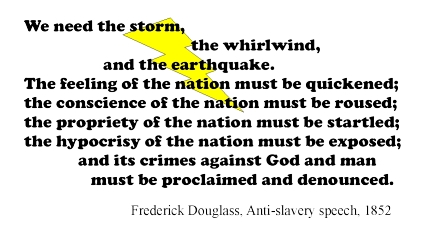| Nineteenth
century movement to end slavery in the United States. |
 |
|
|
At the time of the
American Revolution, several individuals and churches saw that slavery
contradicted American ideals of liberty. The campaign to end slavery,
however, grew with nineteenth century
evangelicalism, which combined revivalism and reform. After experiencing
conversion, many new Christians went on to seek perfection in society.
The American Anti-Slavery Society was formed in 1833, and soon had active
"chapters" throughout the northern states. William Lloyd Garrison, of
radical Quaker origins, was the editor of The
Liberator, the foremost anti-slavery paper. Abolitionism was a broad
movement: some abolitionists favored gradually phasing out slavery and
others demanded immediate emancipation. Harriet Beecher Stowe's novel,
Uncle Tom's Cabin, first published in 1852, convinced a wide readership
that slavery should be abolished. African-
American churches and leaders such as Douglass,
Truth, and Tubman opposed slavery vigorously.
|